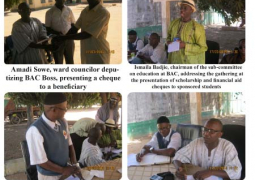The meeting last week between senior customs officials from The Gambia and Senegal, we are told, discussed the re-opening of the Basse-Badiara route to Senegal and beyond, which was closed for years now.
This land route is an important transport and communication link between The Gambia, through Senegal to the sub-region.
Indeed, it is a vital transit route for goods arriving at Banjul port, destined for countries such as Mali in the sub-region, as well as for The Gambia's re-exports trade with other West African nations.
Thus, the convening of this meeting is a most welcomed development, and should further consolidate the recent move by the authorities of the two states towards greater regional integration.
The Gambia and Senegal customs officials definitely have a crucial role to play in this regard. And as such the meeting is a testimony of their desire to help achieve this by facilitating legitimate trade, as well as the free movement of people, goods and services through the most direct routes.
We also note the decision of our two country's customs officials to ensure that there is adequate surveillance to prevent any potential threats to the security of the two countries and peoples, including the safety of the international trade routes.
There is no doubt that, considering the importance of cross border trade, the re-opening of the Basse-Badiara road ransit route to Mali and beyond would be an excellent development for regional progress, since it would boost trade and other exchanges in the area.
Knowing that The Gambia and Senegal have a unique relationship due to our historical, geographical and cultural ties, what we can state here without fear of any contradictions, is that there is an absolute need to continue to strengthen the co-operation, share experiences, challenges and information between our two custom officials.
It is, therefore, expected that the recent visit of the Senegalese custom chiefs to The Gambia and their meeting with their Gambian counterparts will help address some of the common issues, such as the joint customs post intelligence exchange on fraud, automated customs interfacing connectivity, facilitation of the ECOWAS trade liberalisation schemes, implementation of interstate road transport, intelligence exchange on instances of frauds, intervention and practical cases and the adopting of reports, among other things.
We take this opportunity to urge the heads of our immigration services to take a cue from the customs officers, and work diligently to ensure the free movement of persons among ECOWAS member states. For instance, the ECOWAS member states need to speed up the adoption and use of the harmonised ECOWAS passport across the region.
Free movement is definitely a crucial pillar of regional integration, and good for the economic stability of the region. The protocol on free movement should be respected, so as to fast-track regional integration.
We therefore urge the ECOWAS Commission to ensure that the common passport be operational in all the 15 member states as soon as possible.
We need to open up our borders to promote economic relations, as has happened in the European Union, for example.
Also, there is a need to keep up the campaign to enlighten citizens, as well as continue to sensitise state officials of member states on the ECOWAS protocols relating to free movement in the sub-region.
This is the only way to guarantee that all abide by the rules, in the interest of regional integration.
Read Other Articles In Article (Archive)
NYP To Convene Stakeholders Briefing Today
Aug 19, 2009, 6:43 AM
The Voice of Unity - Part III: Roots of Division
Oct 21, 2011, 2:33 PM


